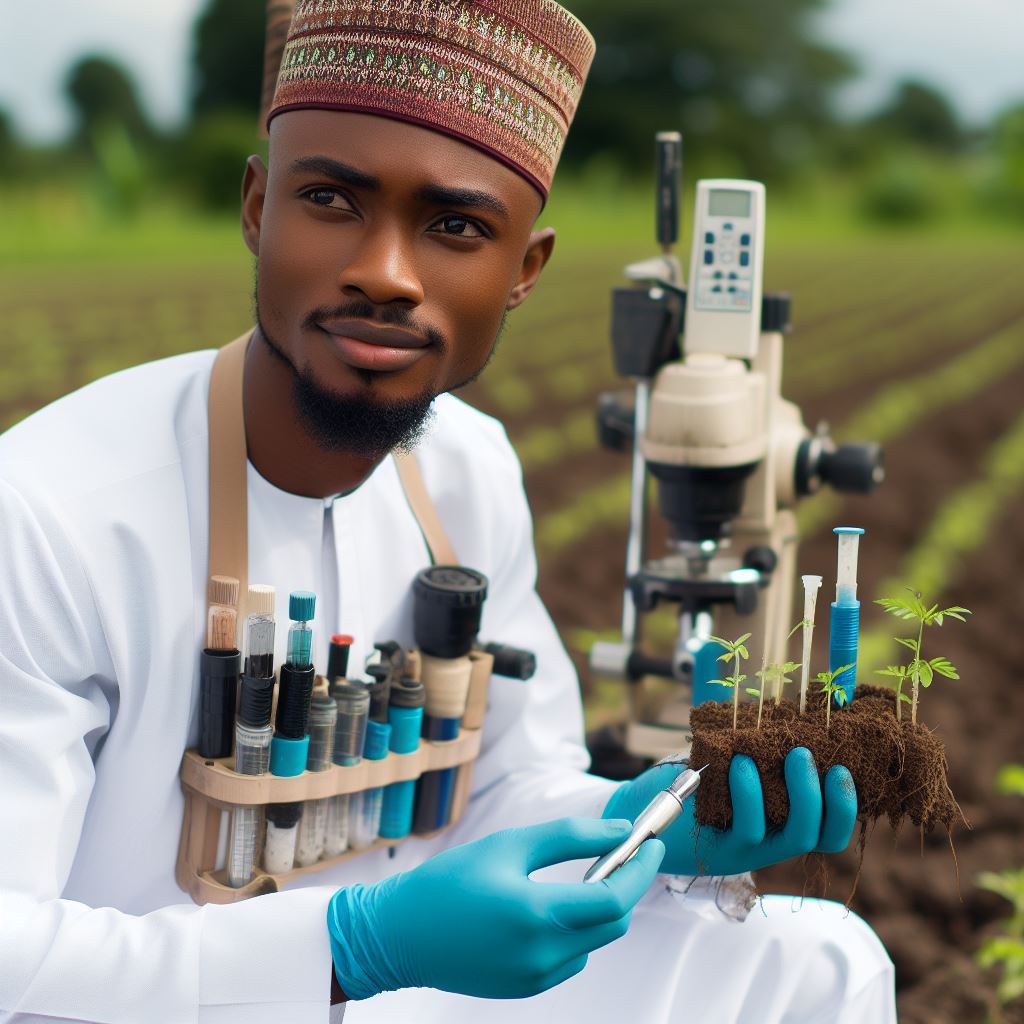Introduction
Crop production plays a vital role in Nigeria’s economy, contributing significantly to food security and income generation.
Universities in Nigeria have a crucial role in providing education and training in crop production to address the growing demand for skilled professionals in the agricultural sector.
These institutions equip students with theoretical knowledge and practical skills necessary for sustainable and efficient crop production practices.
Through research and innovation, universities also contribute to improving crop yields, developing new crop varieties, and promoting agricultural technologies.
By offering specialized courses and programs, universities create a skilled workforce that can address the challenges and opportunities in crop production.
Furthermore, universities collaborate with industry stakeholders, government agencies, and local communities to ensure that their curriculum is relevant and up-to-date.
The academic environment also enables students to engage in fieldwork, internships, and hands-on experiences, enhancing their practical knowledge and problem-solving abilities.
Education and training in crop production empower individuals with the expertise needed to contribute to Nigeria’s agricultural sector, fostering economic growth and development.
In essence, Nigeria’s universities play a significant role in providing education and training in crop production, contributing to the country’s agricultural development and ensuring food security.
Overview of Crop Production Courses in Nigeria
Crop production courses play a significant role in Nigeria’s agricultural sector.
With a growing population and increasing demand for food, these courses are crucial in ensuring sustainable agricultural practices and food security in the country.
Significance of Crop Production Courses
The agricultural sector is the backbone of Nigeria’s economy, employing a large portion of the population.
Crop production courses equip students with the necessary skills and knowledge to contribute effectively to this sector.
The courses cover various aspects of crop production, including crop selection, cultivation techniques, pest and disease management, soil fertility, and post-harvest handling.
These skills are essential for improving crop yield and quality, and ultimately increasing agricultural productivity.
Variety of Courses and Specializations
Nigeria’s top universities offer a wide variety of crop production courses to cater to the diverse needs of students interested in this field.
Some of the common courses include:
- Agronomy: This course focuses on the science and practice of crop production, including crop physiology, soil management, and weed control.
- Horticulture: Specializing in horticulture enables students to learn about the cultivation, management, and marketing of fruits, vegetables, and ornamental plants.
- Plant Breeding and Genetics: This course emphasizes the development of new plant varieties with desirable traits, such as disease resistance and increased yield.
- Plant Pathology: Students studying plant pathology learn to identify, manage, and control plant diseases and pathogens that can significantly impact crop production.
- Soil Science: Soil science courses teach students about soil properties, fertility management, and soil conservation techniques to enhance crop growth and productivity.
These courses provide a broad foundation of knowledge while also allowing students to specialize in specific areas of crop production based on their interests and career goals.
Career Prospects for Graduates in Crop Production
Graduates with a degree in crop production have a wide range of career opportunities both in the public and private sectors.
Some potential career prospects include:
- Agronomist: Agronomists work directly with farmers, providing advice on crop selection, fertilization, and pest management to enhance agricultural productivity.
- Agricultural Extension Officer: Extension officers promote modern farming techniques and technologies by providing training and support services to farmers.
- Plant Breeder: Plant breeders develop improved crop varieties through controlled breeding programs, contributing to increased crop yield and quality.
- Sales and Marketing Manager: Graduates can pursue careers in agricultural input companies, where they can work in sales and marketing roles, promoting crop production products such as seeds, fertilizers, and pesticides.
- Agricultural Researcher: Working in research institutes, graduates can contribute to scientific advancements in crop production by conducting experiments, developing innovative techniques, and finding sustainable solutions to agricultural challenges.
The demand for skilled professionals in crop production is continuously growing, and graduates in this field have excellent job prospects.
They also have the opportunity to become entrepreneurs and start their own agribusinesses.
In fact, crop production courses in Nigeria’s top universities are of significant importance to the agricultural sector.
These courses provide students with the necessary skills and knowledge to contribute to sustainable agricultural practices, ensuring food security in the country.
The variety of courses and specializations available cater to diverse interests, and the potential career prospects for graduates are diverse and promising.
Read: Nigeria’s Role in Advancing African Crop Production Education
Top Universities Offering Crop Production Courses in Nigeria
Below is a list of Nigeria’s top universities that are renowned for their crop production programs:
- University of Ibadan
- Ahmadu Bello University
- Federal University of Agriculture, Abeokuta
- University of Nigeria, Nsukka
- Obafemi Awolowo University
Let’s take a closer look at each university’s reputation, achievements, and unique features:
1. University of Ibadan
The University of Ibadan, located in Oyo State, is known for its excellence in crop production studies.
It offers comprehensive programs and cutting-edge facilities for agricultural research and education.
The university’s Faculty of Agriculture and Forestry is highly regarded for its research contributions towards improving crop production methods and addressing agricultural challenges in Nigeria.
With state-of-the-art laboratories, experimental farms, and well-equipped classrooms, the University of Ibadan provides students with hands-on experiences and practical training.
2. Ahmadu Bello University
Ahmadu Bello University, situated in Zaria, Kaduna State, is another institution notable for its crop production programs.
It has a long-standing history of producing competent agricultural professionals.
The university’s Institute for Agricultural Research (IAR) is renowned for its significant contributions to sustainable crop production and agricultural development in Nigeria.
The IAR conducts groundbreaking research and provides technical support to farmers and agricultural organizations.
With its extensive network of agricultural research stations and demonstration farms, Ahmadu Bello University offers students valuable experiential learning opportunities.
3. Federal University of Agriculture, Abeokuta
The Federal University of Agriculture, Abeokuta (FUNAAB), located in Ogun State, specializes in agriculture-related fields, including crop production.
FUNAAB has a reputation for its focus on practical agricultural education and research.
It collaborates with various agricultural agencies and organizations to develop innovative crop production techniques and promote sustainable farming practices.
Transform Your Career with Expert Guidance
Get personalized mentorship consulting that’s tailored to your unique path. Our expert advice is actionable and exclusive.
Get StartedThe university’s teaching farms and modern agricultural laboratory facilities enable students to gain hands-on experience in crop production, soil science, and plant breeding.
4. University of Nigeria, Nsukka
The University of Nigeria, Nsukka (UNN), situated in Enugu State, offers comprehensive crop production programs and is recognized for its contributions to agricultural advancement in Nigeria.
UNN’s Faculty of Agriculture is known for its research on crop improvement, pest and disease management, and crop diversification.
It actively engages in providing agricultural solutions to farmers and promoting sustainable farming practices.
The university’s well-maintained experimental farms and greenhouses provide students with practical training and research opportunities in crop production.
5. Obafemi Awolowo University
Obafemi Awolowo University (OAU), located in Osun State, is renowned for its agricultural programs, including crop production.
The university’s faculty members are actively involved in research, focusing on crop breeding, precision agriculture, and agri-business development.
OAU’s agricultural research stations and farms enable students to gain practical skills in crop production techniques, crop protection, and post-harvest handling.
In short, Nigeria’s top universities offering crop production courses, including the University of Ibadan, Ahmadu Bello University, Federal University of Agriculture, Abeokuta, University of Nigeria, Nsukka, and Obafemi Awolowo University, are known for their distinguished reputation, remarkable achievements, and unique facilities in the field.
These universities provide students with exceptional educational opportunities and practical experiences, shaping them into competent agricultural professionals.
Read: A Comprehensive Overview: Crop Production in Nigerian Varsities
Course Curriculum and Specializations
Subjects and Topics Covered in Crop Production Courses
Crop production courses in Nigeria’s top universities cover a variety of subjects and topics.
These courses combine theoretical knowledge with practical skills to provide students with a comprehensive understanding of crop production.
Some of the common subjects and topics covered include:
- Crop Physiology: This subject focuses on understanding the growth, development, and functioning of crops.
- Soil Science: Students learn about soil fertility, soil structure, and soil management techniques for optimum crop production.
- Plant Breeding and Genetics: This subject explores different breeding techniques and genetic principles used to develop improved crop varieties.
- Crop Protection: Students study methods to prevent and control pests, diseases, and weed infestations in crop production.
- Agroecology: This subject emphasizes the importance of sustainable agriculture, including ecological principles and practices.
- Crop Production Systems: Students gain knowledge about various cropping systems and strategies for efficient crop production.
- Agricultural Marketing and Farm Business Management: This subject helps students understand the economic aspects of crop production, including marketing strategies and farm management techniques.
Overview of Specializations in Crop Production
Within the field of crop production, students can choose to specialize in different areas based on their interests and career goals.
Some of the common specializations available include:
- Plant Breeding and Genetics: Students interested in developing new crop varieties and improving plant genetic traits can specialize in this field.
- Crop Protection: Specializing in crop protection equips students with skills to identify and manage crop pests, diseases, and weeds effectively.
- Sustainable Agriculture: This specialization focuses on environmentally-friendly and sustainable crop production practices.
- Agronomy: Students specializing in agronomy gain in-depth knowledge of crop production techniques, soil management, and crop nutrition.
- Horticulture: This specialization focuses on the cultivation of fruits, vegetables, flowers, and ornamental plants.
Equipping Students with Necessary Skills
Crop production courses in Nigeria’s top universities are designed to equip students with the necessary skills to excel in the field.
These courses provide a combination of theoretical knowledge, practical training, and hands-on experience. The skills acquired through these courses include:
- Understanding the principles of crop physiology and plant growth for improved crop production.
- Proficiency in soil management techniques to ensure optimum soil fertility and crop yield.
- Knowledge of breeding methods and genetic principles to develop improved crop varieties.
- Ability to identify and manage pests, diseases, and weeds effectively to minimize crop losses.
- Understanding agroecological principles and sustainable agriculture practices.
- Proficiency in farm business management and marketing strategies for successful crop production ventures.
By offering a wide range of subjects, specialized areas of study, and practical training, crop production courses in Nigeria’s top universities ensure that students are well-prepared to meet the challenges of the agricultural industry and contribute to the nation’s food security.
Read: Scholarships & Grants for Crop Production Students in Nigeria

Faculty and Research Opportunities
Qualifications and expertise of the faculty members at these universities
One of the key factors affecting the quality of education in crop production at Nigeria’s top universities is the expertise and qualifications of the faculty members.
The faculty at these universities are highly qualified and possess extensive knowledge in the field of crop production.
For instance, at the University of Ibadan, renowned professors with PhDs in various aspects of crop production lead the Department of Agronomy.
Their expertise covers areas such as soil fertility, plant breeding, pest management, and crop physiology.
With their vast experience, these faculty members provide students with the necessary guidance and knowledge needed to excel in crop production.
A similar scenario can be found at Ahmadu Bello University in Zaria.
The faculty members in the Department of Crop Protection and Environmental Biology have diverse backgrounds and specializations.
They have conducted extensive research and published numerous papers in prestigious scientific journals. This expertise is instrumental in delivering high-quality education to students.
Notable research or projects being conducted in crop production
Research is an essential aspect of crop production, and these universities are actively involved in groundbreaking studies and projects.
For instance, the University of Nigeria, Nsukka, is engaged in research on sustainable agricultural practices in crop production.
This research aims to develop innovative farming methods that minimize environmental impact while maximizing crop yield.
Similarly, the Federal University of Agriculture, Abeokuta, focuses on research projects related to biotechnology and crop improvement.
These initiatives aim to enhance the resistance of crops to pests and diseases, thereby increasing overall productivity.
Such research projects contribute to the advancement of crop production techniques and provide students with exposed to the latest developments in the field.
Opportunities for students to get involved in research or practical experience
It is worth mentioning that these universities provide ample opportunities for students to get involved in research or gain practical experience.
Students can work closely with faculty members on ongoing research projects, assisting in data collection, analysis, and experimentation.
This hands-on experience helps students hone their practical skills and gain a deeper understanding of crop production techniques.
Additionally, these universities often organize workshops, seminars, and conferences where students can present their research findings or gain further knowledge through interactions with experts in the field.
This exposure encourages students to develop a scientific mindset and fosters a passion for research in crop production.
Nigeria’s top universities offer excellent faculty members who possess expertise in various aspects of crop production.
The faculty members’ qualifications and research activities contribute significantly to the quality of education in this field.
Furthermore, the universities provide students with opportunities to engage in research and gain practical experience, enabling them to develop essential skills and contribute to the advancement of crop production in Nigeria.
Read: Studying Abroad: Opportunities for Nigerian Students
Alumni Success Stories
Olumide Ibrahim
- Graduated from the University of Ibadan with a degree in Crop Production.
- Established a successful commercial farm that specializes in tomato cultivation.
- Received multiple awards for his innovative farming techniques and high-quality produce.
- His education at the University of Ibadan equipped him with the necessary skills and knowledge in crop production.
Adeola Adewale
- Obtained a Bachelor’s degree in Crop Science from Ahmadu Bello University.
- Became a renowned researcher in the field of pest management in crop production.
- Published several papers and presented at international conferences.
- Her education at Ahmadu Bello University gave her a strong foundation in crop science and research methodologies.
Chukwuemeka Chukwu
- Completed his studies in Agronomy at the University of Nigeria, Nsukka.
- Started his own organic farming venture focused on sustainable crop production.
- Received recognition for his contribution to promoting environmentally friendly farming practices.
- The University of Nigeria, Nsukka provided him with holistic knowledge of agronomy and sustainable crop production.
Nkechi Okafor
- Graduated from the Federal University of Agriculture, Abeokuta with a degree in Crop Protection.
- Established a successful consultancy firm providing advice on crop disease prevention and management.
- Received accolades for her expertise in diagnosing and treating crop diseases.
- Her education at the Federal University of Agriculture, Abeokuta equipped her with in-depth knowledge of plant pathology and crop protection practices.
Okechukwu Eze
- Studied Crop Science at the University of Ilorin.
- Became a leading expert in hybrid seed development for staple crops.
- Developed high-yielding varieties that contributed to increased food production in Nigeria.
- His education at the University of Ilorin played a crucial role in his development as a crop scientist.
These success stories demonstrate the impact of top Nigerian universities in shaping successful careers in crop production.
The alumni mentioned above have not only achieved remarkable personal success but have also made significant contributions to the field.
Their education at these universities provided them with the necessary foundation and skills to excel in the world of crop production.
Through innovative farming techniques, research, consultancy, and hybrid seed development, these alumni have played a vital role in promoting agricultural growth and food security in Nigeria.
Admission Requirements and Application Process
Admission Requirements for Crop Production Courses
- High school diploma or equivalent is typically required for admission into crop production courses.
- Applicants must have a strong background in science, particularly in subjects related to agriculture.
- Excellent academic performance in relevant subjects such as biology, chemistry, and mathematics is essential.
- Some universities may require a minimum GPA or specific grade level in science subjects.
- Proficiency in English language is necessary, and some universities may require TOEFL or IELTS scores for international students.
- Certain universities may have additional requirements specific to their crop production programs.
Application Process and Necessary Entrance Exams or Interviews
- Prospective students need to complete the application form provided by the university or through an online portal.
- The application typically requires personal information, educational background, and contact details.
- Applicants may be required to submit official high school transcripts and any relevant certificates or documents.
- Some universities may require a statement of purpose or an essay highlighting the applicant’s interest in crop production.
- Certain universities may also conduct interviews with applicants either in person or through video conferencing.
- Entrance exams specific to crop production courses may be required, depending on the university.
- These exams may assess the applicant’s knowledge in subjects such as biology, chemistry, and mathematics.
- It is essential to check the specific requirements of each university and the corresponding deadlines for submission.
Scholarships and Financial Aid Options
- Various scholarships and financial aid options are available to support students pursuing crop production courses in Nigeria.
- Nigerian government scholarships such as the Federal Government Scholarship Scheme and the Nigerian Award Scholarship are available.
- Many universities offer merit-based scholarships for outstanding academic performance in crop production programs.
- Some universities also provide need-based scholarships, taking into consideration the financial situation of the student.
- Private organizations and foundations may offer scholarships specifically for agricultural and crop production students.
- Students can also explore financial aid options such as grants, work-study programs, and student loans.
- It is advisable to research and contact the universities and relevant organizations for detailed information on available scholarships and financial aid.
Admission into crop production courses in Nigeria’s top universities requires meeting specific requirements and completing the application process.
A strong academic background in science and excellent performance in relevant subjects are crucial.
English language proficiency and additional entrance exams or interviews may be necessary.
Scholarships and financial aid options are available to support students pursuing crop production courses.
Government scholarships, university scholarships, and private organizations offer various opportunities for financial assistance.
Prospective students should thoroughly research and carefully follow the application procedures and deadlines to increase their chances of admission and securing financial support.
Conclusion
As we conclude our discussion on “Key Courses in Crop Production: Nigeria’s Top Universities,” it is important to recap the significance of these courses in Nigeria.
Crop production plays a vital role in the country’s agricultural sector, providing food security and contributing to the economy.
For prospective students considering a career in crop production, we highly encourage you to pursue these courses.
By studying crop production, you can gain knowledge and skills that are in high demand in the agricultural industry.
Lastly, it is crucial to acknowledge the importance of education and training in the field of agriculture.
The challenges and opportunities in crop production require professionals with a strong foundation and understanding of the latest techniques and technologies.
By obtaining a comprehensive education in crop production, you will not only contribute to the agricultural sector but also play a role in addressing the world’s increasing demand for food.
Your skills and expertise can make a difference in ensuring sustainable farming practices and improving food production in Nigeria and beyond.
So, if you have a passion for agriculture and the drive to make a positive impact on your country and the world, pursuing a career in crop production is a wise choice.
Empower yourself with knowledge, contribute to Nigeria’s agricultural development, and be part of the solution to global food security.




